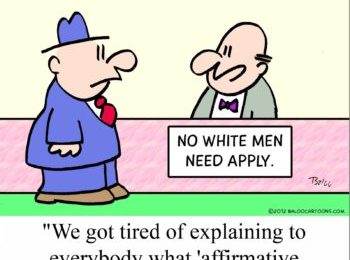 The well known scene showing the prominent Star of David twice in Spielberg’s Saving Private Ryan. The scene appears twice, once in the beginning of the film and once near the end and powerfully suggests a larger Jewish role in the Normandy invasion than shown by historical fact.
The well known scene showing the prominent Star of David twice in Spielberg’s Saving Private Ryan. The scene appears twice, once in the beginning of the film and once near the end and powerfully suggests a larger Jewish role in the Normandy invasion than shown by historical fact.
The Culture of Deceit, Part II
Edmund Connelly
Two weeks ago, I showed that deceiving non-Jews was normative behavior for the Jewish community historically. As I wrote, “illegal activities involving deception and deceit are tolerated within the Jewish community. . . . The only ethical principle involved here is the age old ‘Is it good for the Jews?’”
I focused on financial crimes because they have been in the news for so long now and have involved Jews to a degree that most astute people can’t miss. Of course no human group is entirely free of deception or financial misdeeds but, as I argued, there seems to be a greater likelihood of financial crime among Jews (again, see here for an academic treatment that tiptoes around the issue). More importantly, I continued, Jewish white collar criminals do not face censure within their own communities.” For instance Moshe Rosenberg, an Orthodox rabbi, lamented that “Unfortunately, unethical and even illegal behavior too often does not face serious censure in our communities.”
From financial fraud and manipulation, I moved on to literary deceit, pointing to specific instances of Jewish deception by some of the most esteemed authors of our time. I did this because I hoped to show that it is not merely the desire for money that motivates Jewish deception. Rather, as I seek to illustrate, deceit is a normative aspect of Jewish culture. That is, it is not censured as it commonly is among, say, Christians. Instead, it is sanctioned as long as it is directed toward outgroups.
Today I would like to focus on another area in which American Jews have attempted to hoodwink their fellow Americans into believing that Jews have made more sacrifices than in fact they have — military bravery and sacrifice.
Valor on the battlefield and recognition of that valor are central to many cultures, including most Western cultures. As our last “Good War,” World War II occupies an important place not only in American history but in American mythology as well. In that war, the story goes, we reluctantly set out to smite forces of pure evil that threatened the entire world, from the Pacific theater to Europe.
Perhaps more remarkable is the fact that the question of Jewish valor in that war still makes the headlines. For instance, during the Clinton Administration, Larry Lawrence, U.S. Ambassador to Switzerland, died and was buried in Arlington National Cemetery.
One of America’s richest men, Lawrence owned the Hotel Del Coronado in San Diego, where his friend President Bill Clinton vacationed. Lawrence’s claim to the right to be buried in Arlington hinged on his assertion that he had had served in the Merchant Marine during WWII and had been injured. In fact, he had avoided the draft and never served.
The U.S. Army is in charge of Arlington Cemetery, so Army personnel carefully checked Lawrence’s story but found nothing to support it. Richard Holbrooke, who also happens to be Jewish, was Assistant Secretary of State at the time and appealed to the White House on Lawrence’s behalf. His request was granted, and Clinton presided over the 1996 burial.
As the New York Times reported, however, “Confronted with mounting evidence that M. Larry Lawrence, the late Ambassador to Switzerland, had fabricated a heroic World War II record, his widow decided today to have his remains exhumed from Arlington National Cemetery, where he was granted burial under an unusual waiver.”
Another Jewish WWII soldier, Sgt. David Rubitsky, claims to have accomplished superhuman feats. He was serving in New Guinea in 1942 when the Japanese attacked. As Joseph Farah reported in 2001:
Rubitsky watched the Japanese soldiers move small artillery pieces, heavy machine guns, mortars and anti-aircraft armaments into the area. He watched as more and more soldiers gathered. Anticipating a surprise attack by the Japanese on his 2nd Battalion, Rubitsky decided to lead his own surprise attack.
He opened fire. As Japanese soldiers advanced toward his bunker, Rubitsky used every weapon in his arsenal for nine grueling hours of intense fighting. He alternated between firing his .30-caliber water-cooled machine gun with 3,000 rounds of ammunition, a Browning automatic rifle with close to 600 rounds, his M-1 rifle, a pistol and tossing some of his 35 hand grenades.
Rubitsky spent a total of 21 hours in the bunker — including nine under heavy siege. The Japanese army attacked from three different directions – the north, south and west. . . . When Lt. Col. Herbert Smith came up to the bunker the next day, he estimated that Rubitsky had single-handedly killed 500 to 600 Japanese soldiers, thereby saving his own battalion from being decimated in a surprise attack.
Rubitsky made strenuous efforts to receive the Congressional Medal of Honor but insists it was denied because of anti-Semitism. The Anti-Defamation League initially aided Rubitsky’s campaign, as did the media generally. For example, as one researcher noted, “Newspaper and magazine articles, with references to ‘anti-Semitism’ [related to the Rubitsky campaign], appeared in such prestige publications as TIME and the New York Times.”
This researcher then added that “Because of the lobbying efforts of the ADL, including a resolution signed by 92 members of Congress, in 1987 the U.S. Army undertook a two-year review of David Rubitsky’s story. On December 8, 1989, after obtaining evidence from forensic specialists and taking statements from Rubitsky and 20 others who served alongside him, the U.S. Army concluded that Rubitsky’s claim was unfounded.”
To date, it is not known if Hollywood plans a bio-pic of Sgt. David Rubitsky.
As you can see, there are varying levels of spin used in these accounts. Of note is the support given by the (heavily Jewish) media and by Jewish activist organizations to validate these accounts. They create a narrative where Jews have allegedly performed valiantly, yet anti-Semitism, blatant or otherwise, has once again dogged these deserving Jews.
Steven Spielberg has contributed to this perception. In his film Saving Private Ryan, for instance, from the very beginning he visually insinuates that Jewish G.I.s made sacrifices comparable to that of their non-Jewish fellow soldiers. As the now-aged Mr. Ryan walks into the American cemetery in Normandy, his all-White family trailing him, director Spielberg fills the screen with a white cross, followed immediately by a grave with a Star of David (see the 1:50 mark on this YouTube outtake). That is a rather transparent bias when we next observe Ryan walking among a sea of Crosses over the graves of dead non-Jews. Spielberg repeats the scene at the film’s close (0:25 and 1:37 from this clip).
This brings to mind the story of former Congressman and now White House Chief of Staff Rahm Emanuel. Unlike, say, Larry Lawrence, who did not serve during WWII, Emanuel did serve his country during the first Gulf War — as an Israeli soldier in Israel. In his book Rulers and Ruled in the US Empire: Bankers, Zionists and Militants, scholar James Petras notes that “less than 2/10 of one percent (0.2 percent) of the US soldiers in Iraq were Jewish and probably very few of those were on the front lines. More young American Jews volunteer to serve in the Israeli Defense Forces.” Of course this recalls Pat Buchanan’s 1990 claim that should America prosecute the first war on Iraq in favor of Israeli interests, the fighting would be done by kids “with names like McAllister, Murphy, Gonzales, and Leroy Brown.”
In any case, let me return to my central argument that deception is central to Jewish behavior — and it is not something they are ashamed of. As evidence of this, look at one of the founding myths Jews have of themselves, the biblical story of Jacob and Esau:
And the Lord said unto Rebecca, “Two nations are in thy womb, and two manner of people shall be separated from thy bowels; and the one people shall be stronger than the other people; and the elder shall serve the younger.” And when her days to be delivered were fulfilled…the first came out all red, all over like a hairy garment; and they called his name Esau. And after that came his brother out, and his hand took ahold of Esau’s heel; and his name was called Jacob. (Gen. 25:23-26)
Historian Albert Lindemann unpacks the meaning of this story in Esau’s Tears: Modern Anti-Semitism and the Rise of the Jews:
Indeed, the division between Jew and Gentile goes to the very origins and structures of western civilization. It predates the advent of Christianity and may be found in the earliest texts of the Old Testament . . . In those texts of the Hebrew Bible the mythical origins of the division between Jews and others are described, and a thought-provoking explanation for the antagonism of the two groups is offered. The account in Genesis of Esau and Jacob, twin brothers born to Rebecca and Isaac, has evoked a seemingly endless cycle of interpretations. Already in the earliest Jewish commentaries on the text in Genesis one encounters not only the rich layers of meaning but also the elusiveness, the profound ambiguity in the relationship between Jew (in archetype, Jacob) and Gentile (in archetype, Esau).
What is the archetype of the Jew in the Jews’ own founding myth? It is that of the liar or trickster. Recall what happened in Genesis 27:5-45. Nearing death, the elderly Isaac sent Esau out to trap game in order to prepare a meal appropriate to the blessing Isaac was to bestow upon his first son. With Rebecca’s participation, Jacob deceived his father into believing that he was in fact Esau. Numerous times Isaac suspected a ruse, finally asking, “Are you really my son Esau?” “I am,” Jacob lied. Jacob was ultimately successful in deceiving his father and received his blessing.
This passage is a stark instance in which we see one origin for the still-common Jewish belief that others (goyim) are to serve them. “Let peoples serve you, and nations bow down to you. Be lord over your brothers.”
Also of note is Isaac’s ambivalent blessing to his deceived son Esau: “Behold, away from the fatness of the earth shall your dwelling be, and away from the dew of heaven on high. By your sword you shall live, but your brother you shall serve.” About the only hopeful note comes when Isaac concludes: “But when you break loose you shall break his [Jacob’s] yoke from your neck.”
If one prefers to put a positive spin on the value of deceit, turn to Yuri Slezkine’s exposition of the Mercurian archetype in his book The Jewish Century. He explains that the Mercurians, including Jews, “possess a quality that the Greeks called metis, or ‘cunning intelligence.’” Thus Jews, as descendants of “tricksters,” are proud to possess such a trait, one that non-Jews (“Apollonians” in Slezkine’s dualism) deplore. Host cultures see Jews and other Mercurians as “devious, acquisitive, greedy, crafty, pushy, and crude.” Sounds familiar.
The bottom line is that non-Jews need to be realistic about this Jewish trait and not entertain notions that Jews can be shamed out of such belief and behavior. For example, the biblical story of Esther, which I related last week, captures Jewish pride in defeating their non-Jewish enemies by using deception. As with other Jewish biblical stories, Esther begins with deception and ends with the Israelites slaughtering their enemies and achieving high status and power.
Again, these messages appear repeatedly in the Old Testament. In the Book of Genesis, for example, God promises his Chosen People: “May God give you of the dew of heaven, and of the fatness of the earth, and plenty of grain and wine. Let peoples serve you, and nations bow down to you.” Later, in Deuteronomy 6:10–11, God promises to give great and goodly cities “which you did not build, and houses full of all good things, which you did not fill, and cisterns hewn out, which you did not hew, and vineyards and olive trees, which you did not plant.“
In Joshua 24:12–13, God tells the Jews: “I gave you a land on which you had not labored, and cities which you had not built, and you dwell therein; you eat the fruit of vineyards and oliveyards which you did not plant.”
How do you think they accomplished this? People do not simply hand over their cities to invaders. If in fact God did intervene and perform a miracle, well, that’s one thing. Still, it suggests something we keep seeing throughout history — Jews becoming a dominant elite over native populations.
I hope readers will accept that part of this success indeed stems from Jewish use of deception, a practice that is not going to go away. In closing, I’ll turn to Canadian poet David Solway, who mockingly wrote recently, “We Jews are a sly and surreptitious people. It pains me to admit this, but candor compels.” But here, of course, Solway is using deception, for in fact he is simply telling the truth. Do not be fooled by the trickster’s resort to mockery to veil the truth.
From The Occidental Quarterly. Edmund Connelly (email him) is a freelance writer, academic, and expert on the cinema arts. He is a frequent contributor The Occidental Quarterly.



